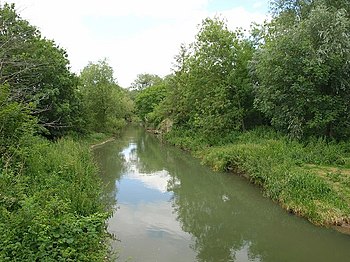Bulstake Stream: Difference between revisions
No edit summary |
mNo edit summary |
||
| Line 2: | Line 2: | ||
'''Bulstake Stream''', also spelt '''Bullstake Stream''', is a backwater of the [[River Thames]] at [[Oxford]]. It leaves the main stream of the Thames at a river junction known as Four Rivers, at the south-west corner of [[Fiddler's Island]], running west of the main line of the Thames. | '''Bulstake Stream''', also spelt '''Bullstake Stream''', is a backwater of the [[River Thames]] at [[Oxford]]. It leaves the main stream of the Thames at a river junction known as Four Rivers, at the south-west corner of [[Fiddler's Island]], running west of the main line of the Thames. | ||
The stream immediately flows past Tumbling Bay, the site of a bathing place in use from 1853 to 1990.<ref>{{cite web|last=Graham|first=Malcolm|title=TUM 150: Recreation at Tumbling Bay 1853-2010|url=http://www.oxfordsoftwaredocumentation.com/wowg/tumbling_bay.html|accessdate=2011-02-03}}.</ref> It follows a semi-circular course, west and then south, passing under bridges on Binsey Lane and | The stream immediately flows past Tumbling Bay, the site of a bathing place in use from 1853 to 1990.<ref>{{cite web|last=Graham|first=Malcolm|title=TUM 150: Recreation at Tumbling Bay 1853-2010|url=http://www.oxfordsoftwaredocumentation.com/wowg/tumbling_bay.html|accessdate=2011-02-03}}.</ref> It follows a semi-circular course, west and then south, passing under bridges on Binsey Lane and Botley Road, briefly forming the county border with [[Berkshire]] to a confluence with [[Seacourt Stream]] near [[North Hinksey]]. It then flows east past Osney Mead Industrial Estate, and rejoins the Thames at the Osney Rail Bridge. The [[Thames Path]] crosses the stream on a bridge known as Boney's Bridge.<ref>[http://thames.me.uk/s01740.htm Where Thames Smooth Waters Glide: Osney Railway Bridge]</ref> | ||
The stream between Seacourt Stream and the Thames is also known as Potts Stream or Pot Stream. | The stream between Seacourt Stream and the Thames is also known as Potts Stream or Pot Stream. | ||
Latest revision as of 23:02, 3 January 2016

Bulstake Stream, also spelt Bullstake Stream, is a backwater of the River Thames at Oxford. It leaves the main stream of the Thames at a river junction known as Four Rivers, at the south-west corner of Fiddler's Island, running west of the main line of the Thames.
The stream immediately flows past Tumbling Bay, the site of a bathing place in use from 1853 to 1990.[1] It follows a semi-circular course, west and then south, passing under bridges on Binsey Lane and Botley Road, briefly forming the county border with Berkshire to a confluence with Seacourt Stream near North Hinksey. It then flows east past Osney Mead Industrial Estate, and rejoins the Thames at the Osney Rail Bridge. The Thames Path crosses the stream on a bridge known as Boney's Bridge.[2]
The stream between Seacourt Stream and the Thames is also known as Potts Stream or Pot Stream.
Until 1790, the stream was the main navigation channel of the Thames.[3] It became a backwater when Osney Lock was opened.
Outside links
References
- ↑ Graham, Malcolm. "TUM 150: Recreation at Tumbling Bay 1853-2010". http://www.oxfordsoftwaredocumentation.com/wowg/tumbling_bay.html. Retrieved 2011-02-03..
- ↑ Where Thames Smooth Waters Glide: Osney Railway Bridge
- ↑ Crossley, Alan; Elrington, C.R. (eds.); Chance, Eleanor; Colvin, Christina; Cooper, Janet; Day, C.J.; Hassall, T.G.; Selwyn, Nesta (1979). A History of the County of Oxford, Volume 4: Communications: Rivers and River Navigation. Victoria County History. http://www.british-history.ac.uk/report.aspx?compid=22808#s5.